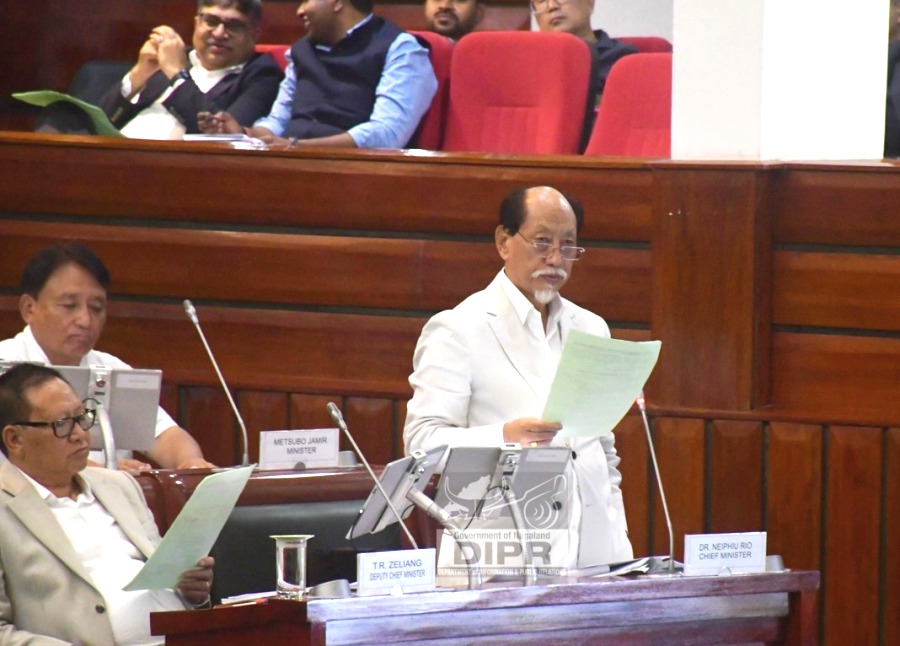CM Rio calls for shared responsibility to protect indigenous rights, clarifying ILP, RIIN, and government measures in Nagaland.
Share

KOHIMA — Chief Minister Neiphiu Rio on Thursday called for collective efforts to protect the indigenous people of the state, stressing the government’s commitment while urging everyone to treat it as a shared responsibility instead of merely pointing fingers at the government.
He was delivering the concluding remarks on the last day of the Seventh Session of the 14th Nagaland Legislative Assembly (NLA) in Kohima.
Rio acknowledged MLA Kuzholuzo Nienu for initiating a discussion on ‘Safeguarding the Rights of Indigenous Communities,’ which saw enthusiastic participation from legislators concerned about the safety, rights, and protection of the state’s rich cultural traditions and indigenous status.
He highlighted the recognition accorded by the British to the Nagas, which led to the Bengal Eastern Frontier Regulation (BEFR) 1873 giving protection to Naga people in the form of the present-day Inner Line Permit (ILP), and now further protected under Article 371(A) of the Indian Constitution.
Also read: MLAs push for Indigenous Affairs department in Nagaland
Stating that with BEFR, Nagaland is well-protected, Rio said that it explicitly prohibits outsiders or non-indigenous people from acquiring land and immovable property.
The chief minister clarified that although the Gorkhas have been in Nagaland for a long time, this does not make them indigenous. He explained that indigenous people are distinct from migrants who may come and settle as permanent residents.
He further pointed out that of the 60 seats in the NLA, only one is open to any Indian citizen, while the remaining 59 are reserved for the indigenous inhabitants of Nagaland. Stressing that the term indigenous should not be taken lightly, he highlighted the crucial role of village councils in identifying indigenous people of the state.
More from 14th NLA Sessions: Reservation rethink: NPP’s Dr. Rhutso calls for new ‘General’ and ‘Reservation’ categories in Nagaland policy
On the Registration of Indigenous Inhabitants of Nagaland (RIIN), Rio said that the government has already notified its Cabinet decision on September 20, 2024, and elaborated on the registration process.
He also clarified that, on the same date, the government had issued another notification stating that Nagas need not go through enumeration like electoral roll preparation. Instead, a committee would be set up to certify the genuineness and recognition of applicants claiming indigenous status.
However, for the non-Naga tribes—Kuki, Kachari, Garo, and Mikir (Karbi)—enumeration is required, with cut-off dates fixed: December 31, 1940 for Nepalis (Gorkhas), and 1963 for the other four tribes.
Rio added that unless enumeration proves that an individual’s family had settled before the cut-off year, supported by electoral rolls or property records, the certifying authority could face criminal charges for false or wrongful certification.
He reasoned that unless such enumeration is carried out, people from these communities could be deemed non-indigenous, which would affect their eligibility for government employment. He therefore called on both civil society and the government to work together to ensure proper enumeration.
For effective implementation of ILP, Rio referred to the August 14, 2025 notification and urged all government officials, contractors, house owners, and village councils to ensure that all migrant workers are registered with the administrative officer.
He further stressed the need to reduce dependency on migrant workers, encouraging Naga youth to take up various jobs. He reiterated the government’s commitment to meritocracy and highlighted initiatives to promote entrepreneurship.
Additionally, Rio announced that beginning this year’s Hornbill Festival, a separate Coffee Festival would be introduced to connect producers with markets and services.
On the demand for a department of Indigenous Affairs, the chief minister clarified that while he was not opposed to the idea, the Home department was already handling related matters effectively. He added that a new department could be considered if necessary.
He also acknowledged MLA Dr. Tseilhoutuo Rhutso’s suggestion regarding the state’s job reservation policy, assuring that the government would ensure maximum justice while supporting weaker sections of society.
Rio reminded that earlier committees had been set up to address such concerns and reiterated that the government remains receptive to issues raised by tribal hohos, civil society, and NLA members.
He informed the House that a cabinet sub-committee was formed to review the state’s reservation policy, which submitted its report in October 2021.
The report broadly recommended a comprehensive review based on the 2021 Census. However, since the Census figures were not released, the review relied on the 2011 Census.
Rio also highlighted that the state government has now set up a commission to address the differences in reservation policy and expressed hope that Census 2027 would provide a more accurate basis for reforms. He urged collective efforts to ensure the best possible census.